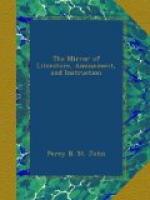Some plants discharge their seeds. Thus, a certain fungus has the property of ejecting its seeds with great force and rapidity, and with a loud cracking noise, and yet it is no bigger than a pin’s head!
Why is a milky fluid found in the cocoa-nut?
Because in this case, as well as in a few others, all the fluids destined to nourish the embryo of the fruit does not harden, whence a greater or less quantity of this kind of mild emulsion is contained within the kernel.
Why are certain eatable roots unfit for the table when the plants have flowered?
Because the mucus or proper juice in the tubular cells being appropriated for perfecting the flower stem, the flower, and the fruit, is absorbed as the fructification of the stem advances; and, as these are perfected, the cells are emptied, and their sides become ligneous.
Why is the Jerusalem Artichoke so called?
Because of its corruption from its Italian name, Girasole Articiocco, sunflower artichoke, as the plant was first brought from Peru to Italy, and thence propagated throughout Europe.—Smith.
* * * * *
AMERICAN MANNERS.
We suspect certain pages of Mrs. Trollope’s Domestic Manners of the Americans to be highly coloured, but they are cleverly written, and will be read with considerable interest.
A Backwoodsman.
“We visited one farm, which interested us particularly from its wild and lonely situation, and from the entire dependence of the inhabitants upon their own resources. It was a partial clearing in the very heart of the forest. The house was built on the side of a hill, so steep that a high ladder was necessary to enter the front door, while the back one opened against the hill-side; at the foot of this sudden eminence ran a clear stream, whose bed had been deepened into a little reservoir, just opposite the house. A noble field of Indian corn stretched away into the forest on one side, and a few half-cleared acres, with a shed or two upon them, occupied the other, giving accommodation to cows, horses, pigs, and chickens innumerable. Immediately before the house was a small potato garden, with a few peach and apple trees. The house was built of logs, and consisted of two rooms, besides a little shanty or lean-to, that was used as a kitchen. Both rooms were comfortably furnished with good beds, drawers, &c. The farmer’s wife, and a young woman who looked like her sister, were spinning, and three little children were playing about. The woman told me that they spun and wove all the cotton and woollen garments of the family, and knit all the stockings; her husband, though not a shoe-maker by trade, made all the shoes. She manufactured all the soap and candles they used, and prepared her sugar from the sugar-trees on their farm. All she wanted with money, she said, was to buy coffee,




